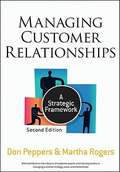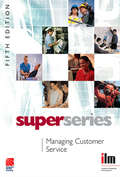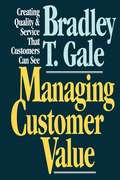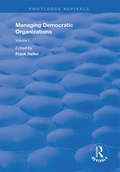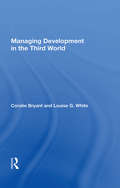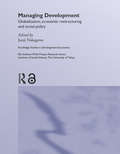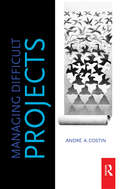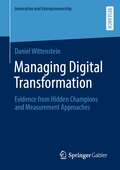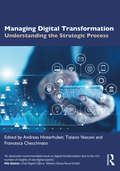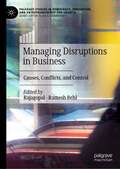- Table View
- List View
Managing Customer Relationships
by Don Peppers Martha RogersMANAGING CUSTOMER RELATIONSHIPS A Strategic Framework Praise for the first edition: "Peppers and Rogers do a beautiful job of integrating actionable frameworks, the thinking of other leaders in the field, and best practices from leading-edge companies. "-Dr. Hugh J. Watson, C. Herman and Mary Virginia Terry Chair of Business Administration, Terry College of Business, University of Georgia "Peppers and Rogers have been the vanguard for the developing field of customer relationship management, and in this book, they bring their wealth of experience and knowledge into academic focus. This text successfully centers the development of the field and its theories and methodologies squarely within the broader context of enterprise competitive theory. It is a must-have for educators of customer relationship management and anyone who considers customer-centric marketing the cornerstone of sound corporate strategy. " -Dr. Charlotte Mason, Department Head, Director, and Professor, Department of Marketing and Distribution, Terry College of Business, University of Georgia "Don and Martha have done it again! The useful concepts and rich case studies revealed in Managing Customer Relationships remove any excuse for those of us responsible for actually delivering one-to-one customer results. This is the ultimate inside scoop!" -Roy Barnes, Formerly with Marriott, now President, Blue Space Consulting "This is going to become the how-to book on developing a customer-driven enterprise. The marketplace is so much in need of this road map!" -Mike Henry, Leader for Consumer Insights at Acxiom Praise for the second edition: "Every company has customers, and that's why every company needs a reference guide like this. Peppers and Rogers are uniquely qualified to provide us with the top textbook on the subject, and the essential tool for the field they helped to create. " -David Reibstein, William Stewart Woodside Professor of Marketing, The Wharton School, University of Pennsylvania
Managing Customer Relationships Using Customer Care Techniques: Strategy Development of an International Enterprise
by Anna Brzozowska Arnold Pabian Barbara Pabian Stanisław BrzezińskiIn today’s global business environment, Customer Relationship Management (CRM) has become key to the success of many international enterprises. Managing Customer Relationships Using Customer Care Techniques: Strategy Development of an International Enterprise offers a comprehensive analysis of this crucial business aspect, focusing on how companies can effectively manage their customer relationships in the context of global expansion. This book stands out with its unique approach to CRM, blending theory with practice and providing readers with a deep understanding of how CRM influences the strategies of international enterprises.The book is divided into four main parts, each focusing on a different aspect of customer relationship management. The first part focuses on creating strategies in the context of customer relationships in international enterprises, the second part discusses the essence of the CRM concept in companies, the third part delves into the strategy of a global enterprise from the customer relationship perspective, and the fourth part centers on the evaluation and optimization of customer care strategy in modern business.Key Features:• In-depth analysis of the CRM concept in the context of international business.• Discussion on the evolution of the CRM idea over the years.• Introduction to integrated customer relationship management systems in global enterprises.• Analysis of the impact of social media on CRM.• Practical insights on measuring the effectiveness of customer care activities.Managing Customer Relationships Using Customer Care Techniques: Strategy Development of an International Enterprise is a must-read for managers, business consultants, business students, and anyone wanting to understand how to effectively manage customer relationships in an international business environment.
Managing Customer Retention
by Robert C. Blattberg Gary Getz Jacquelyn S. ThomasAlthough initial promotions may lead to first-time purchases, a crucial factor in determining customer retention is the difference between customers' expectations and the perceived quality of the product and continued customer service. This chapter discusses determinants of customer retention and strategies with which to manage them.
Managing Customer Service (Institute of Learning & Management Super Series)
by Institute of Leadership & ManagementSuper series are a set of workbooks to accompany the flexible learning programme specifically designed and developed by the Institute of Leadership & Management (ILM) to support their Level 3 Certificate in First Line Management. The learning content is also closely aligned to the Level 3 S/NVQ in Management. The series consists of 35 workbooks. Each book will map on to a course unit (35 books/units).
Managing Customer Value
by Bradley GaleEven today with quality improvement the battle cry of American industry, the quality programs in most companies are limited to "conformance to technical standards," according to quality expert Bradley Gale. While some have ventured a step farther to measure customer satisfaction, few of them, Gale demonstrates, have attempted to track market-perceived "quality" -- how buyers select among competing suppliers, why orders are won or lost, and which competitors are succeeding in which market segments. Using cases including Milliken & Company; AT&T, United Van Lines, and Gillette, Gale shows how leading-edge companies have gone beyond the minimal achievements of conformance quality and customer satisfaction to focus on the third, higher stage, "market-perceived quality versus competitors" and aspire to an emerging fourth stage, "true strategic management." Drawing on his extensive research at AT&T, Johnson & Johnson, Parke-Davis, and other world-class companies, Gale provides new metrics for market-perceived quality that are straightforward and easy to interpret. His set of seven integrative tools for customer value analysis makes up the heart of the "war room wall" to help guide business-unit teams in their effort to outperform competitors in satisfying customers. The great value of these tools is that they are derived from a future-oriented strategic navigation system that tracks competitive information and market-perceived quality. Learning to master this system accelerates customer satisfaction from a slogan to a science and leads ultimately to true strategic management -- the fourth stage of Total Quality Management. The processes described in this book provide an insider's perspective on the criteria of the Baldrige Award. Bradley Gale's insights and innovative methods for defining, measuring, and improving market-perceived quality will create an entirely new thrust for the worldwide quality movement.
Managing Customers Through Economic Cycles
by John MckeanWhether you are a global Fortune 500 organization or a small business Managing Customers Through Economic Cycles show you how to optimize your business's sales and marketing approaches specific to survive and thrive in each economic cycle and transition. "The business case for continuing to invest in service and innovation can be compromised by an economic downturn. McKean clearly lays out the case for weathering the economic storm by achieving a careful balance of investment in the areas that truly matter - and continually using data to reinforce the idea that business can be more science than art, after all. " -Barbara Higgins, Vice-President, Worldwide Contact Centers, United Airlines "John McKean's work has served as practical guide for me and my teammates. I have seen countless examples of businesses managing their customers' experience with a short term economic view. If the right principles are employed consistently, as John teaches us, we can create the right emotional experience that delivers growth and loyalty - as well as the improved operating leverage - that are needed in good times and in tough times. Consistency of values and experiences keeps companies from having to be reactionary and short sighted in a down economy. Thanks, John, for another practical lesson. " -John Quinn, former Customer Service and Support Executive, Bank of America "In good times and bad, forecasting where business is headed is both art and science. As John McKean so eloquently states, marrying data driven analytics with consumer insight is critical for managing through tough economic cycles. This book is a must read for anyone intent on driving greater profitability and consistently out-behaving the competition. " -Joni Newkirk, CEO, Integrated Insight, Inc. , former SVP, Business Insight & Improvement, Walt Disney Parks & Resorts "John McKean continues his pursuit of the profitable customer through the turbulent world of boom and bust. His book provides valuable insights into how businesses survive and thrive in a volatile economic climate. " -Trevor Dukes, Business Systems, WH Smith "The rise of customer power coupled with challenging economic conditions demand that organizations leverage the power of the Internet and related technologies to stay relevant to their customers. As John McKean points out in his compelling new book, successful firms have built a core competency in leveraging information technology not only to survive economic transitions but thrive in an ever-changing economy. " -Erik Brynjolfsson, Professor, MIT Sloan School and co-author of Wired for Innovation: How Information Technology is Reshaping the Economy "It would be hard to name a more relevant or timely topic for sales and marketing today than that of how to cope with economic downturns and upturns, and this is exactly the subject John McKean has insightfully tackled head-on in Managing Customers Through Economic Cycles. " -Don Peppers and Martha Rogers, Ph. D. , Peppers & Rogers Group
Managing Cyber Risk
by Ariel EvansCyber risk is the second highest perceived business risk according to U.S. risk managers and corporate insurance experts. Digital assets now represent over 85% of an organization’s value. In a survey of Fortune 1000 organizations, 83% surveyed described cyber risk as an organizationally complex topic, with most using only qualitative metrics that provide little, if any insight into an effective cyber strategy. Written by one of the foremost cyber risk experts in the world and with contributions from other senior professionals in the field, Managing Cyber Risk provides corporate cyber stakeholders – managers, executives, and directors – with context and tools to accomplish several strategic objectives. These include enabling managers to understand and have proper governance oversight of this crucial area and ensuring improved cyber resilience. Managing Cyber Risk helps businesses to understand cyber risk quantification in business terms that lead risk owners to determine how much cyber insurance they should buy based on the size and the scope of policy, the cyber budget required, and how to prioritize risk remediation based on reputational, operational, legal, and financial impacts. Directors are held to standards of fiduciary duty, loyalty, and care. These insights provide the ability to demonstrate that directors have appropriately discharged their duties, which often dictates the ability to successfully rebut claims made against such individuals. Cyber is a strategic business issue that requires quantitative metrics to ensure cyber resiliency. This handbook acts as a roadmap for executives to understand how to increase cyber resiliency and is unique since it quantifies exposures at the digital asset level.
Managing Cybersecurity Risk: Cases Studies and Solutions
by Jonathan ReuvidThe first edition, published November 2016, was targeted at the directors and senior managers of SMEs and larger organisations that have not yet paid sufficient attention to cybersecurity and possibly did not appreciate the scale or severity of permanent risk to their businesses. <P><P> The book was an important wake-up call and primer and proved a significant success, including wide global reach and diverse additional use of the chapter content through media outlets. <P><P> The new edition, targeted at a similar readership, will provide more detailed information about the cybersecurity environment and specific threats. It will offer advice on the resources available to build defences and the selection of tools and managed services to achieve enhanced security at acceptable cost. A content sharing partnership has been agreed with major technology provider Alien Vault and the 2017 edition will be a larger book of approximately 250 pages.
Managing Debt For Dummies (For Dummies Ser.)
by Mary Reed John VenturaIf you’re trying to kick the “Buy Now/Pay Later” habit and get your spiraling debt under control, you need Managing Debt For Dummies now! This practical, commonsense guide provides straightforward strategies for coping with every kind of secured and unsecured debt, including, personal loans, car loans, mortgages, home equity loans, lines of credit, credit cards, finance company loans, and student loans. You’ll find out how easy it is to: Distinguish between good and bad debt Go on a “debt diet” to get back into financial shape Start a filing system to track debt and protect life after debt Adopt a smart spending regimen Increase your income Consolidate your debt Decide which bills to pay when you can’t pay them all Use credit cards responsibly You can still live well while slashing spending on groceries, clothing, and entertainment. Find out how in Managing Debt for Dummies.
Managing Decline: A Research Overview (State of the Art in Business Research)
by Juha-Antti Lamberg Antti Sihvonen Henrikki TikkanenA growing body of literature in the area of business administration has focused on the phenomenon of decline. These studies span multiple levels of analysis and draws on a range of disciplines, including strategic management, economics, and economic geography. Managing Decline: A Research Overview provides a summary of this research by focusing on three key levels of analysis: industries, clusters, and organizations. The targeted reviews in this book map each individual level of analysis separately and the discussion section outlines overarching themes regarding decline and its management. The three levels are analyzed by identifying different forms, causes, processes, and management options regarding decline. This is accompanied by the identification of key academic discourses that have been used to analyze decline. The discussion section highlights broader themes regarding the nature and management of decline that span across the different levels of analysis. This book provides an easy-to-access summary on the nature and management of decline for academic scholars and business practitioners, and is essential reading for getting an overview of this broad field of research.
Managing Democratic Organizations I: Volume I (Routledge Revivals)
by Frank HellerFirst published in 2000, this volume, along with its counterpart, consist of contributions to the history of management and management thought which ask and assess how important managing democratic organizations is today, and how important it will prove to be moving forward, presenting both optimistic and pessimistic interpretations. This collection describes three interrelated research programmes in the form of 38 classic essays and lists 21 authors.
Managing Development In The Third World
by Coralie BryantThis is the first text to focus on the problems and processes involved in organizing, implementing, and managing programs and projects aimed at relieving poverty and underdevelopment in the Third World. During the 1970s there was a shift in development assistance programs toward a greater concern for equity and the basic needs of the poor. The auth
Managing Development: Globalization, Economic Restructuring and Social Policy (Routledge Studies in Development Economics)
by Junji NakagawaGlobalization in the 1990s provided both opportunities and challenges for developing and transition economies. Though for some, it offered the chance to achieve economic growth through active involvement in the integrated and liberalized world economy, it also increased their vulnerability to external shocks and volatility. As a consequence, stakeholders at every level of the development and transition process – international organizations, national governments and the private sector – had to review their strategies in order to adjust to the new world economic environment. As the Mexican peso crisis of 1994-1995 and the Asian financial crisis of 1997-1998 showed dramatically, the cost of maladjustment was not only very high but it also affected many more stakeholders than before, due to the contagious effects of crises. This revealing book analyzes the different methods employed to manage globalization and development. Bringing together an international team of contributors, including Barbara Stallings, Alicia Giron and J. C. Ferraz, it will prove to be a valuable resource for those involved in the fields of development economics and political economy.
Managing Diabetes in Low Income Countries: Providing Sustainable Diabetes Care with Limited Resources
by Ivica SmokovskiThis book covers the complexity of diabetes and related complications and presents the socio-economic burden of the disease, taking into account the rising prevalence reaching pandemic proportions and the associated costs. Factors causing high diabetes prevalence and the influence of the pharmaceutical industry are evaluated and solutions for sustainable diabetes care with limited resources are provided, including national focus on providing cost-effective diabetes treatment, nutrition and physical activity, structured diabetes education and centralized National e-Health System. Moreover, elaboration of long-term efforts to curb the diabetes burden through prevention activities are presented in this book.Managing Diabetes in Low Income Countries represents an essential guide for diabetes care clinicians and researchers, medical students and clinicians in training, diabetes policy makers, regulatory authorities, international diabetes and patient organisations all of whom are involved in current clinical practice for diabetes management.
Managing Difficult People
by Marilyn PincusDon't Let Negaholics Rule Your Workplace! As a manager, you're sandwiched between the pressure of senior executives and the demands of your own staff memebers. The last thing you need is an unruly employee whose chronic "negaholic" attitude upsets your office applecart and affects the morale of your entire staff. Managing Difficult People gives you the tools you need to cope with all kinds of difficult employees. From sneaky slackers to resident office tormentors, this handy guide cuts to the chase, helping you identify and deal with specific personality types such as The Bully, The Complainer or Whiner, The Procrastinator, The Know-It-All, The Silent Type, The Social Butterfly, The "No People Skills" Person, The Rookie, The Overly Sensitive Person, and The Manipulator.
Managing Difficult People
by Marilyn PincusDon't Let Negaholics Rule Your Workplace! As a manager, you're sandwiched between the pressure of senior executives and the demands of your own staff memebers. The last thing you need is an unruly employee whose chronic "negaholic" attitude upsets your office applecart and affects the morale of your entire staff. Managing Difficult People gives you the tools you need to cope with all kinds of difficult employees. From sneaky slackers to resident office tormentors, this handy guide cuts to the chase, helping you identify and deal with specific personality types such as The Bully, The Complainer or Whiner, The Procrastinator, The Know-It-All, The Silent Type, The Social Butterfly, The "No People Skills" Person, The Rookie, The Overly Sensitive Person, and The Manipulator.
Managing Difficult People in a Week: Teach Yourself
by David CottonThe ability to manage difficult people successfully is crucial to anyone who wants to advance their career. Written by David Cotton, leading expert as both a coach and practitioner, this book quickly teaches you the insider secrets you need to know to in order to successfully manage difficult people. The highly motivational 'in a week' structure of the book provides seven straightforward chapters explaining the key points, and at the end there are optional questions to ensure you have taken it all in. There are also cartoons and diagrams throughout, to help make this book a more enjoyable and effective learning experience. So what are you waiting for? Let this book put you on the fast track to success! Sunday: Understanding and preventing difficult behaviour Monday: Developing your skills for managing difficult people Tuesday: More advanced skills for managing difficult people Wednesday: Managing specific types of difficult behaviour Thursday: Feedback that works and critical converstions Friday: Managing conflict Saturday: Getting support and escalating issues
Managing Difficult People: A Survival Guide For Handling Any Employee
by Marilyn PincusDon't Let Negaholics Rule Your Workplace!As a manager, you're sandwiched between the pressure of senior executives and the demands of your own staff memebers. The last thing you need is an unruly employee whose chronic "negaholic" attitude upsets your office applecart and affects the morale of your entire staff.Managing Difficult People gives you the tools you need to cope with all kinds of difficult employees. From sneaky slackers to resident office tormentors, this handy guide cuts to the chase, helping you identify and deal with specific personality types such as The Bully, The Complainer or Whiner, The Procrastinator, The Know-It-All, The Silent Type, The Social Butterfly, The "No People Skills" Person, The Rookie, The Overly Sensitive Person, and The Manipulator.
Managing Difficult People: A Survival Guide for Handling Any Employee
by Michael S. Dobson Marilyn Pincus Richard Mintzer John Riddle Gary R. Mcclain Deborah S. Romaine Bob AdamsAs a manager, you're sandwiched between the pressure of senior executives and the demands of your own staff members. The last thing you need is an unruly employee whose chronic "negaholic" attitude upsets your office applecart and affects the morale of your entire staff. Managing Difficult People gives you the tools you need to cope with all kinds of difficult employees. From sneaky slackers to resident office tormentors, this handy guide cuts to the chase, helping you identify and deal with specific personality types such as: # The Bully # The Complainer or Whiner # The Procrastinator # The Know-It-All # The Silent Type # The Social Butterfly # The "No People Skills" Person # The Rookie # The Overly Sensitive Person # The Manipulator It's time to take charge of all the difficult situations that come your way. Follow these positive, proactive guidelines for targeting telltale behaviors, and put an end to office strife once and for all!
Managing Difficult Projects
by Andre CostinManaging Difficult Projects pulls together the principles and practice of project management and presents useful diagnostic approaches, tools and structures in a clear and practical way. The book focuses on the diagnosis and resolution of “difficult” problems whether in large or small complex projects. The intent is to help corporate executives and project management practitioners apply proven processes, methodologies, systems, structures and tools to rally the information and the resources required for better decisions, faster delivery and improved results.This essential book shows how to plan effectively and to reduce risk at every step of project delivery, particulary vital during project implementation when 90% of project funding is spent.It covers new ground by proposing the use of the project management process as an integral part of setting and updating corporate strategy. In projects, context is everything! The text is amply illustrated with international case studies, charts, photos, graphs and data tables.
Managing Digital Transformation: Evidence from Hidden Champions and Measurement Approaches (Innovation und Entrepreneurship)
by Daniel WittensteinThe digital transformation of the business environment and its impact on firm performance is of central interest in economics and management. However, it is still an open question how firms should optimally align their business models and strategies for the digital era. Daniel Wittenstein investigates this question by generating novel insights from hidden champions and by developing a machine learning-based approach for measuring firm-level digitalization.
Managing Digital Transformation: Understanding the Strategic Process
by Andreas HinterhuberThis book provides practising executives and academics with the theories and best practices to plan and implement the digital transformation successfully. Key benefits: an overview on how leading companies plan and implement digital transformation interviews with chief executive officers and chief digital officers of leading companies – Bulgari, Deutsche Bahn, Henkel, Lanxess, L’Oréal, Unilever, Thales and others – explore lessons learnt and roadmaps to successful implementation research and case studies on the digitalization of small and medium-sized companies cutting-edge academic research on business models, organizational capabilities and performance implications of the digital transformation tools and insights into how to overcome internal resistance, build digital capabilities, align the organization, develop the ecosystem and create customer value to implement digital strategies that increase profits Managing Digital Transformation is unique in its approach, combining rigorous academic theory with practical insights and contributions from companies that are, according to leading academic thinkers, at the forefront of global best practice in the digital transformation. It is a recommended reading both for practitioners looking to implement digital strategies within their own organisations, as well as for academics and postgraduate students studying digital transformation, strategy and marketing.
Managing Disputes: Mastering the Legal Aspects of Business
by Constance E. BagleyDisputes are inevitable in business, but legally astute managers think strategically about their disputes. This chapter offers a variety of techniques for managing disputes and describes alternative dispute resolution (ADR), recommending that companies adopt ADR programs for regular use in all their business activities.
Managing Disruptions in Business: Causes, Conflicts, and Control (Palgrave Studies in Democracy, Innovation, and Entrepreneurship for Growth)
by Rajagopal Ramesh BehlThis volume discusses business disruptions as strategic to gain market competitiveness. It analyzes the convergence of innovation and technology, business practices, public policies, political ideologies, and consumer values to strengthen competitive business practices through disruptions. Bringing together contributions from global experts, the chapters add to knowledge on contemporary business models, business strategies, radical interventions in manufacturing, services, and marketing organizations. Disruptive innovations led by contemporary trends, tend to transform the market and consumers’ landscape. These trends include shifts from closed to open models of innovation, servitization, and moving from conventional manufacturing and marketing paradigms to industry 4.0 business philosophy. Focused on the triadic themes of disruption, innovation, and management in emerging markets, this book serves as a valuable compendium for research in entrepreneurship development, regional business and development, contemporary political ideologies, and changing social values.
Managing Disruptive Technological Change: A Case Study
by Clayton M. ChristensenUsing the case study format, this chapter illustrates how managers can succeed when faced with disruptive technology change. Written from the point of view of a hypothetical employee of a major automaker faced with the challenge of developing and commercializing an electric vehicle. This chapter was originally published as chapter 10 of "The Innovator's Dilemma: When New Technologies Cause Great Firms to Fail."
